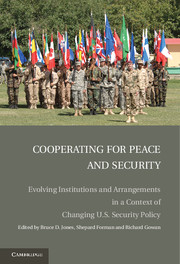 Cooperating for Peace and Security
Cooperating for Peace and Security Published online by Cambridge University Press: 22 January 2010
A distinctive attribute of U.S. global engagement under President George W. Bush was skepticism of the capacity of standing international institutions and alliances to confront the main threats to national and global security, particularly terrorism, rogue states, and the proliferation of weapons of mass destruction (WMD). This attitude, apparent from the first days of the Bush administration, was accentuated by the terrorist attacks on the United States on September 11, 2001.
Although this sentiment was sometimes expressed through unilateral action, including decisions to act alone in pursuit of national objectives or to opt out of international agreements endorsed by the vast majority of other states, the more typical pattern was for the United States to turn to a more flexible form of multilateralism, by championing ad hoc and in some cases temporary coalitions of the willing that coalesced to address new issues. Such informal groupings of like-minded countries under American leadership – beyond avoiding the pathologies of formal multilateral organizations like the United Nations (UN) – promised to expand U.S. policy autonomy and freedom of action and provide greater control over the goals of collective action. The potential costs of this approach, in terms of squandered international legitimacy for U.S. actions and lost opportunities for sharing burdens – to say nothing of the eroded institutional foundations of world order – were only dimly appreciated, particularly during the first term of the Bush administration.
To save this book to your Kindle, first ensure no-reply@cambridge.org is added to your Approved Personal Document E-mail List under your Personal Document Settings on the Manage Your Content and Devices page of your Amazon account. Then enter the ‘name’ part of your Kindle email address below. Find out more about saving to your Kindle.
Note you can select to save to either the @free.kindle.com or @kindle.com variations. ‘@free.kindle.com’ emails are free but can only be saved to your device when it is connected to wi-fi. ‘@kindle.com’ emails can be delivered even when you are not connected to wi-fi, but note that service fees apply.
Find out more about the Kindle Personal Document Service.
To save content items to your account, please confirm that you agree to abide by our usage policies. If this is the first time you use this feature, you will be asked to authorise Cambridge Core to connect with your account. Find out more about saving content to Dropbox.
To save content items to your account, please confirm that you agree to abide by our usage policies. If this is the first time you use this feature, you will be asked to authorise Cambridge Core to connect with your account. Find out more about saving content to Google Drive.